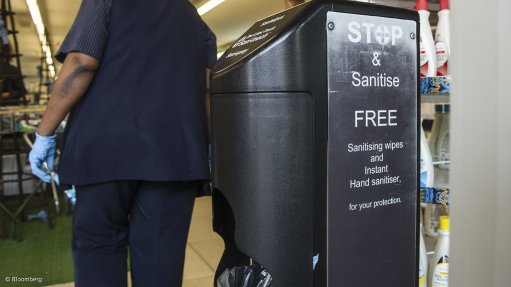
Photo by: Bloomberg
Approximately three-million people in South Africa lost their jobs between February and April as a result of the Covid-19 pandemic, according to the results of a new study. Women accounted for two-million jobs lost.
The National Income Dynamics Study (NIDS) Coronavirus Rapid Mobile Survey (CRAM), which assesses the impact of the Covid-19 pandemic on employment and welfare of a representative sample of 7 000 South Africans, was released on Wednesday. The study surveyed the participants between May 7 and June 27.
Thirty social science researchers from five South African universities helped to put together the study, which spans 11 reports with findings on health, employment and hunger and welfare. At least four more surveys are expected to be conducted this year to serve as a barometer of the impact of the pandemic on households.
The study shows that employment levels declined by 18% between February and April and vulnerable groups were worse affected.
About 17-million people were employed in February 2020, but by April 2020 it had dropped to 14-million. Researchers estimate that between 2.5-million and 3.6-million fewer people were employed over the period.
The study also shows that one in three income earners in February did not earn an income in April. "The proportion of adults who earned an income in February declined by 33% which is made up of a roughly equal share of those who lost their job and those who were furloughed," the report read.
Women bear the brunt
The virus has exacerbated existing inequalities in race, gender, earnings, location, education and occupation, according to the study.
"The coronavirus pandemic is the largest social and economic shock in our lifetime. The rapid spread of this virus around the world and the economic devastation it has left in its wake is unlike anything we have seen before, at least not in our lifetimes," principle investigator Nic Spaull, said in the foreword of the synopsis report.
Job losses were concentrated among those who are already disadvantaged, including women, Africans, the youth and less educated people.
Those in the informal economy were also hard hit. "A larger share of the informal economy were locked out of employment during the month of April," the report read.
Furthermore, the hours worked per week by these informal workers decreased by half. "Decreases in typical working hours were particularly large for women and workers in self-employment and for informal casual workers."
Not only did women account for more than two thirds of the jobs lost over the period, more than half of the respondents said they had to work fewer or no hours. By comparison, only 42% of men reported they had to take fewer hours.
A significant number of those who became unemployed over the period do not receive grant income, the study indicated. "Approximately 30% of those who were retrenched between February and April report no household-level grant protection at all," the report read.
A separate report specifically on the labour market and poverty impacts of Covid-19 indicates that approximately one-million of those who lost their jobs fell into poverty as a result. "Indirectly, accounting for the dependents of these workers, we tentatively estimate that this job loss has increased poverty by about 3-million people," the executive summary of the report read.
These poverty impacts are attributable to the relatively low rates of social insurance – at the time the roll put of social grants had been limited.
The authors of the report stressed that these are merely estimates and should be treated as tentative until more data is revealed in subsequent surveys that will track poverty trends over time.